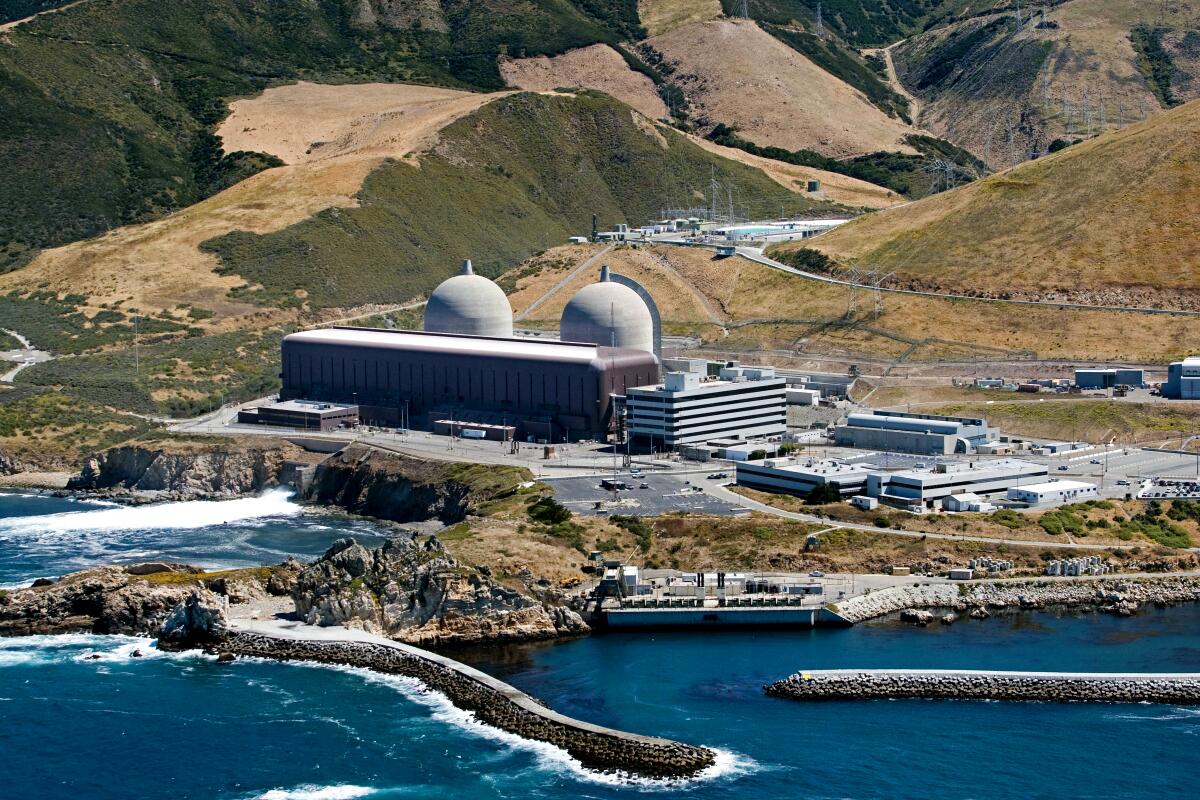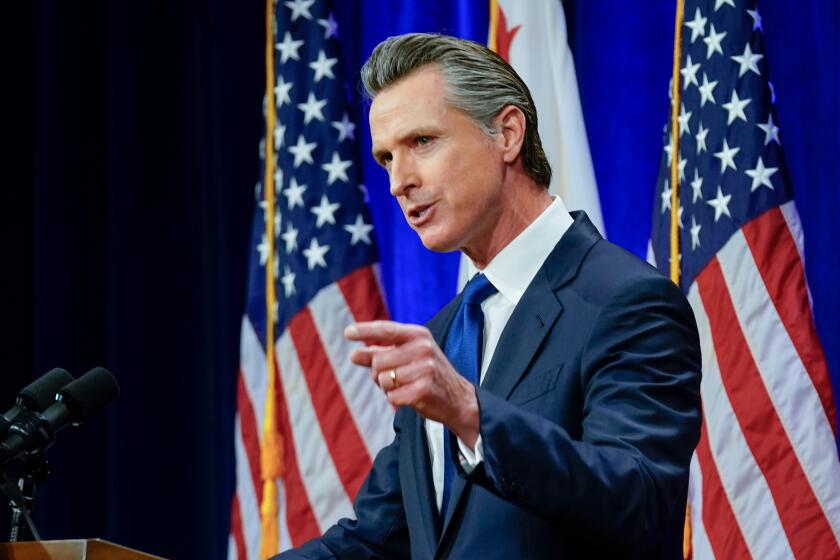Editorial: California can’t count on Diablo Canyon’s nuclear power, so it should spend now on renewables

- Share via
Gov. Gavin Newsom’s proposal to extend the life of California’s last remaining nuclear plant has become a major point of contention in negotiations with state lawmakers as the legislative session enters its final days.
But a counterproposal from members of the state Assembly offers another path to avoid power outages. Their plan would allow the Diablo Canyon plant on the Central Coast to retire in 2025 as scheduled and spend at least $1.4 billion — the same amount Newsom wants to give Pacific Gas & Electric to keep the plant operating through 2035 — on renewable power instead.
That money would be used to accelerate renewable energy, transmission and storage projects, reduce permitting delays for solar, wind and geothermal developments and support programs that pay consumers to use less power on hot summer evenings when the grid is at highest risk for outages. These are common-sense measures to bolster the electrical grid, and they should be taken regardless of whether Newsom’s proposal to keep Diablo Canyon open another decade moves forward.
California lawmakers should work with Gov. Gavin Newsom on his five-point plan to strengthen the state’s climate targets, even though it’s a last-minute effort.
Unlike Newsom’s plan, this alternative does not depend on a single aging plant that has been operating since 1985 and sits near several earthquake fault lines. It relies instead on a diverse array of clean energy sources that are less expensive, per kilowatt-hour, and don’t pose the safety and environmental hazards of nuclear power. They are the same renewable resources California needs anyway to meet its climate targets, reduce health-damaging air pollution and avoid catastrophic heating of the planet. Reaching the state’s goal of 100% renewable and zero-carbon electricity sales by 2045 will require building wind and solar power at roughly triple today’s rates, according to a report last year by state agencies.
Proponents of extending the life of Diablo Canyon argue that having 2,240 megawatts of carbon-free electricity available around the clock for a few more years would provide a buffer against blackouts while the state gets more renewable power and storage up and running. State officials have been scrambling to address concerns that extreme heat, drought, wildfires and supply chain shortages will result in power outages in the coming years, particularly during hot evenings in August and September when solar generation drops off but demand for electricity soars.
But the plan to reverse course and keep running Diablo Canyon is full of risks and obstacles and dependent on decisions and agencies outside state lawmakers’ control. Which is why the administration’s dismissive attitude toward Assembly members’ alternative plan — which a governor’s spokesman likened to “fantasy and fairy dust” — is concerning.
The Newsom administration’s first target is San Francisco, the super-liberal city that may be the NIMBYist of them all.
The governor still hasn’t made the case that keeping Diablo Canyon open will avert more environmental risks than it prolongs. Nor does his plan address the full costs to the environment and to ratepayers, the extent of the maintenance and seismic retrofits needed to ensure the plant can operate safely, and whether the extension will reduce the urgency to deploy renewable energy. Those are real concerns that can’t be glossed over. Though Newsom’s plan would exempt Diablo Canyon from environmental reviews and other requirements, there are no guarantees that the plant will be able to secure the funding and permit approvals and overcome legal challenges to keep operating past 2025. So, for now, state officials need to proceed as if the plant will shut down on schedule.
The governor’s office has presented the Diablo Canyon legislation as something of a sixth pillar to his five-part climate proposal, another last-minute push that nonetheless would advance bold and meaningful actions to confront the climate crisis. But it would be terrible if those vital climate measures are scuttled as Diablo Canyon consumes the time and attention of lawmakers in the final days before the legislative session ends on Aug. 31.
The governor’s office argues it is moving fast because it doesn’t want to miss a September deadline to be considered for $6 billion in federal funds to help save nuclear plants facing closure. But ramming this through late in the session prevents the type of public scrutiny and transparency that could increase environmental and financial protections.
Ensuring a reliable power grid is going to be crucial to the success of the state’s climate programs. Because when the lights go out during a heat wave it doesn’t only erode confidence in California’s transition from fossil fuels, it poses an immediate threat to people’s lives. To reach its greenhouse gas targets, California will need to electrify much of the economy, and state officials expect that will increase power consumption by as much as 68% by 2045.
Whether Diablo Canyon has three more years of life or 13, it is ultimately a stopgap, and no substitute for broader efforts to quickly build clean and affordable energy and storage to power zero-emission cars, homes and buildings needed to fight climate change. Lawmakers have a chance to further those goals with or without nuclear power, and they should act now.
More to Read
A cure for the common opinion
Get thought-provoking perspectives with our weekly newsletter.
You may occasionally receive promotional content from the Los Angeles Times.












